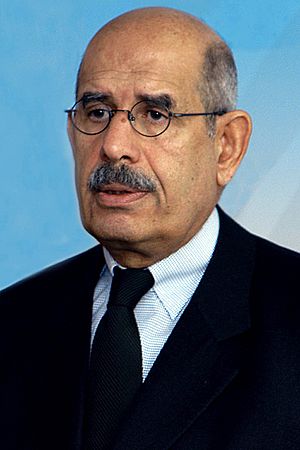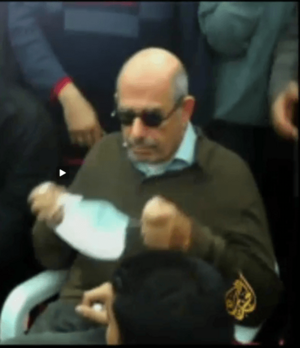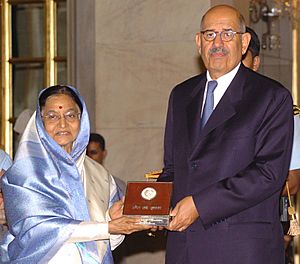Mohamed ElBaradei facts for kids
Quick facts for kids
Mohamed ElBaradei
|
|
|---|---|
|
محمد البرادعي
|
|

ElBaradei in 2005
|
|
| Interim Vice President of Egypt | |
| In office 14 July 2013 – 14 August 2013 |
|
| President | Adly Mansour (interim) |
| Preceded by | Mahmoud Mekki |
| Succeeded by | Vacant |
| Leader of the Constitution Party | |
| In office 28 April 2012 – 14 August 2013 |
|
| Deputy | George Isaac |
| Preceded by | Office established |
| Succeeded by | Sayyed Kassam (acting) Hala Shukrallah |
| 4th Director General of the International Atomic Energy Agency | |
| In office 1 December 1997 – 30 November 2009 |
|
| Preceded by | Hans Blix |
| Succeeded by | Yukiya Amano |
| Personal details | |
| Born |
Mohamed Mostafa ElBaradei
17 June 1942 Cairo, Egypt |
| Political party | Constitution Party |
| Spouse | Aida El Kashef |
| Children | 2 |
| Residences | Vienna, Austria |
| Alma mater | Cairo University Graduate Institute of International and Development Studies New York University |
| Website | Official website: https://web.archive.org/web/20111102123438/http://www.mohamedelbaradei.com/ |
Mohamed Mostafa ElBaradei (Arabic: محمد مصطفى البرادعي, romanized: Muḥammad Muṣṭafá al-Barādaʿī; born 17 June 1942) is an Egyptian lawyer and diplomat. He led the International Atomic Energy Agency (IAEA) from 1997 to 2009. Later, he served as the interim vice president of Egypt for a short time in 2013.
As the head of the IAEA, he and the organization won the Nobel Peace Prize in 2005. They received this award for working to stop nuclear energy from being used for weapons. They also made sure nuclear energy for peaceful uses was as safe as possible. After leaving the IAEA, ElBaradei became well-known for his opinions on Egyptian politics. This included the 2011 Egyptian revolution that led to the removal of President Hosni Mubarak.
Contents
Early Life and Education
Mohamed ElBaradei grew up in Giza Governorate, Egypt. His father, Mostafa ElBaradei, was a lawyer who supported democracy in Egypt. He believed in a free press and fair courts.
Following his father, Mohamed ElBaradei also studied law. He earned his first law degree from the University of Cairo in 1962. He then continued his studies in the United States. He received a master's degree in 1971 and a doctorate in international law in 1974 from New York University School of Law. His doctoral paper was about the right to pass through narrow sea passages during peacetime.
Diplomatic Career
ElBaradei started his career in 1964 at the Egyptian Ministry of Foreign Affairs. He worked for Egypt at the United Nations in New York and Geneva. His work focused on political, legal, and arms control issues. From 1974 to 1978, he was a special assistant to the foreign minister.
In 1980, he became a senior expert at the United Nations Institute for Training and Research (UNITAR). There, he led the International Law Program. He also taught international law at New York University from 1981 to 1987.
In 1984, ElBaradei joined the International Atomic Energy Agency (IAEA). He served as the agency's legal advisor from 1984 to 1993. Then, he became the Assistant Director General for External Relations from 1993 to 1997.
Leading the IAEA (1997–2009)
ElBaradei became the Director General of the IAEA on 1 December 1997. The IAEA is based in Vienna, Austria. During his time, the agency focused on preventing the spread of nuclear weapons. This included inspections in Iraq before the 2003 invasion and discussions about Iran's nuclear program.
The IAEA became very active in trying to stop countries from developing nuclear weapons. They worked in Iraq and Sudan, and later in North Korea and Iran. ElBaradei was re-elected for two more four-year terms. He served until November 2009.
In 2009, ElBaradei stated that there was no proof Iran was close to building a nuclear weapon. He also said that claims about Iran's nuclear threat were too strong. His views sometimes differed from those of countries like the United States and Israel.
First Term as Director General
When ElBaradei took office, he spoke about the importance of international organizations. He said they needed to be helpful, achieve goals, and be fair.
Just before he started, a new agreement called the "Model Additional Protocol" was created. This gave the IAEA more power to check for secret nuclear activities. ElBaradei worked to combine this new protocol with the IAEA's existing safety checks. He urged all countries to adopt this new protocol to make the world safer. By November 2009, 93 countries had adopted it.
After the September 11 attacks in 2001, it became clear that nuclear materials needed better protection. ElBaradei started a nuclear security program. This program helped countries protect their nuclear materials and facilities from theft or terrorist attacks.
Second Term as Director General
A major issue during ElBaradei's second term was the IAEA's inspections in Iraq. ElBaradei disagreed with the United States' reasons for invading Iraq in 2003. He and Hans Blix led UN weapons inspectors in Iraq. In March 2003, ElBaradei told the UN Security Council that documents claiming Iraq tried to buy uranium from Niger were fake.
He believed that using force often makes problems worse instead of solving them. He also said that inspections take time and can work. He felt his conclusion that Saddam Hussein had not restarted his nuclear weapons program was proven right.
ElBaradei wrote in the The New York Times in 2004 about the dangers of nuclear weapons spreading. He said it was wrong for some countries to have these weapons while others relied on them for safety. He warned that if the world did not change, it risked self-destruction.
Third and Final Term as Director General
The United States initially did not want ElBaradei to have a third term in 2005. However, after a meeting between U.S. Secretary of State Condoleezza Rice and ElBaradei, the U.S. dropped its objections. Many countries, including China, Russia, Germany, and France, supported him. They praised his leadership and fairness.
China said he had done "substantial fruitful work" and helped the agency's role in preventing nuclear weapons. Russia also strongly supported his re-election. On 13 June 2005, the IAEA board unanimously re-appointed ElBaradei.
In 2008, ElBaradei announced he would not seek a fourth term. He hoped the agency would find a new leader acceptable to all countries. On 3 July 2009, Yukiya Amano of Japan was chosen as the next IAEA Director General.
Nuclear Fuel Cycle Control
In 2003, ElBaradei suggested a new idea for controlling nuclear materials. He proposed that the processing of materials that could be used in weapons should only happen in facilities controlled by many countries together. He also thought nuclear energy systems should be designed to avoid using materials that could easily be turned into weapons.
He believed that international cooperation in these areas would help prevent the spread of nuclear weapons. It would also allow more countries to benefit from peaceful nuclear technology. However, some countries without nuclear weapons were hesitant. They worried these proposals might limit their right to use nuclear energy for peaceful purposes.
Helping with Cancer Treatment
ElBaradei's work at the IAEA was not only about preventing nuclear weapons. It also focused on using nuclear technology for good. In 2004, he started a program called PACT (Programme of Action for Cancer Therapy). This program aimed to fight cancer in developing countries.
He noted that many developing countries lacked enough machines and doctors for cancer treatment. PACT helped provide cancer treatment in several countries. The IAEA used its share of the 2005 Nobel Peace Prize money to train scientists from developing countries to use nuclear methods to fight cancer and malnutrition.
Egyptian Politics
2011 Egyptian Revolution
ElBaradei became a key figure during the 2011 Egyptian revolution. This revolution led to widespread protests against President Hosni Mubarak. His colleagues said he had always cared about human rights in Egypt. They noted he had used social media like Facebook and Twitter to connect with young Egyptians who wanted change.
On 27 January 2011, ElBaradei returned to Egypt during the protests. He said he was ready to lead a temporary government if the people wanted him to. He joined protesters in Tahrir Square, telling them they had "taken back their rights." He also stated that the people wanted the government to fall.
Some opposition groups asked ElBaradei to form a "national salvation government." However, the Muslim Brotherhood, a large opposition group, said they had not chosen him to represent them. ElBaradei's involvement was seen as important because of his international standing.
Political Parties and Vice Presidency
From 2009 to 2012, some groups suggested ElBaradei as a possible candidate for president. He said he would consider running if there were fair elections and changes to the constitution.
On 24 February 2010, ElBaradei helped form a new political movement called the "National Association for Change." This group aimed for reforms, especially to allow more freedom for independent presidential candidates. On 7 March 2011, he announced his intention to run for president, but later, on 14 January 2012, he decided not to.
On 28 April 2012, ElBaradei launched the Constitution Party. This party aimed to protect the goals of the 2011 revolution based on liberal ideas. He became a leading figure in the Egyptian opposition. In November 2012, his party joined other groups to form the National Salvation Front. This group opposed President Mohamed Morsi's decisions.
In July 2013, ElBaradei was involved in the events that led to the removal of President Mohamed Morsi. He supported the military's plan for a new political path for Egypt. On 14 July 2013, he was sworn in as interim vice president, in charge of international relations.
Resignation
On 14 August 2013, ElBaradei resigned as vice president. This happened after strong actions by security forces against supporters of the removed president, where many lives were lost. In his resignation letter, ElBaradei said he could not continue to be responsible for decisions he disagreed with. He stated he could not bear the responsibility for any more bloodshed. After resigning, he left Egypt for Vienna.
Other Activities
Mohamed ElBaradei is a member of the Global Leadership Foundation. This organization helps support democratic leaders and promotes good governance. It shares the experience of former leaders with current national leaders.
He is also a member of the Global Commission on Drug Policy.
Personal Life
ElBaradei is married to Aida El Kashef, a former teacher. They have two children: a daughter named Laila, who is a lawyer, and a son named Mostafa, who works in IT. They also have two granddaughters.
ElBaradei's first language is Arabic. He also speaks English and French fluently, and knows some German.
Awards and Recognition
2005 Nobel Peace Prize
On 7 October 2005, ElBaradei and the IAEA jointly received the Nobel Peace Prize. They were honored for their efforts to prevent nuclear energy from being used for military purposes. They also worked to ensure peaceful nuclear energy was used safely. ElBaradei gave his prize money to build orphanages in Cairo. The IAEA used its winnings to train scientists from developing countries to fight cancer and malnutrition using nuclear techniques.
In his Nobel lecture, ElBaradei spoke about the challenges of nuclear non-proliferation. He mentioned the illegal trade in nuclear materials and the spread of nuclear weapons. To fight this, he suggested keeping nuclear materials away from extremist groups. He also proposed tighter control over how nuclear materials for weapons are produced. ElBaradei believed that nuclear weapons should have no place in our world if we want to avoid self-destruction.
UN Secretary General Kofi Annan praised the award, saying he was delighted for ElBaradei and the IAEA staff.
Postage Stamps
To celebrate this award, Egypt Post issued two postage stamps on 8 October 2005. On 1 June 2009, Egypt Post released a set of 16 stamps featuring African Nobel Prize winners, including one of ElBaradei.
Other Awards
ElBaradei has received many other awards for his work:
- Decoration for Services to the Republic of Austria (2009)
- Order of Merit of the Federal Republic of Germany (2010)
- "El Athir" award from Algeria
- The Franklin D. Roosevelt Four Freedoms Award (2006)
- James Park Morton Interfaith Award
- Golden Plate award from the American Academy of Achievement
- Jit Trainor award from Georgetown University
- Human Security award from the Muslim Public Affairs Council
- Prix de la Fondation award from the Crans Montana Forum
- Golden Dove of Peace prize from the President of Italy
- Honorary Patron of the University Philosophical Society (2006) of Trinity College, Dublin
- Golden Doves for Peace journalistic prize (2007)
- Grand Cordon of the Order of the Nile, Egypt's highest civilian award
- Award for Distinguished Contribution to the Peaceful Worldwide Use of Nuclear Technology (2007)
- The Mostar 2007 international peace award
- The 2008 "Peacebuilding Award" of the EastWest Institute
- The International Seville NODO Prize for Peace, Security and Inter-Cultural Dialogue
- The 2008 Indira Gandhi Prize for Peace, Disarmament and Development
- The 2009 Delta Prize for Global Understanding
- The XIV International Grupo Compostela-Xunta de Galicia Prize
- Breastplate of the Russian Foreign Ministry "Contribution to International Cooperation"
- Order of Francisc Skorina (Belarus)
- Order of Friendship of Peoples (Belarus)
He has also received honorary doctorates from many universities around the world, including Trinity College, Dublin, New York University, and Cairo University.
ElBaradei is also a member of the Mo Ibrahim Foundation's Ibrahim Prize Committee.
See also
 In Spanish: Mohamed el-Baradei para niños
In Spanish: Mohamed el-Baradei para niños
- Asmaa Mahfouz
- International Atomic Energy Agency
- Wael Ghonim
 | Roy Wilkins |
 | John Lewis |
 | Linda Carol Brown |



